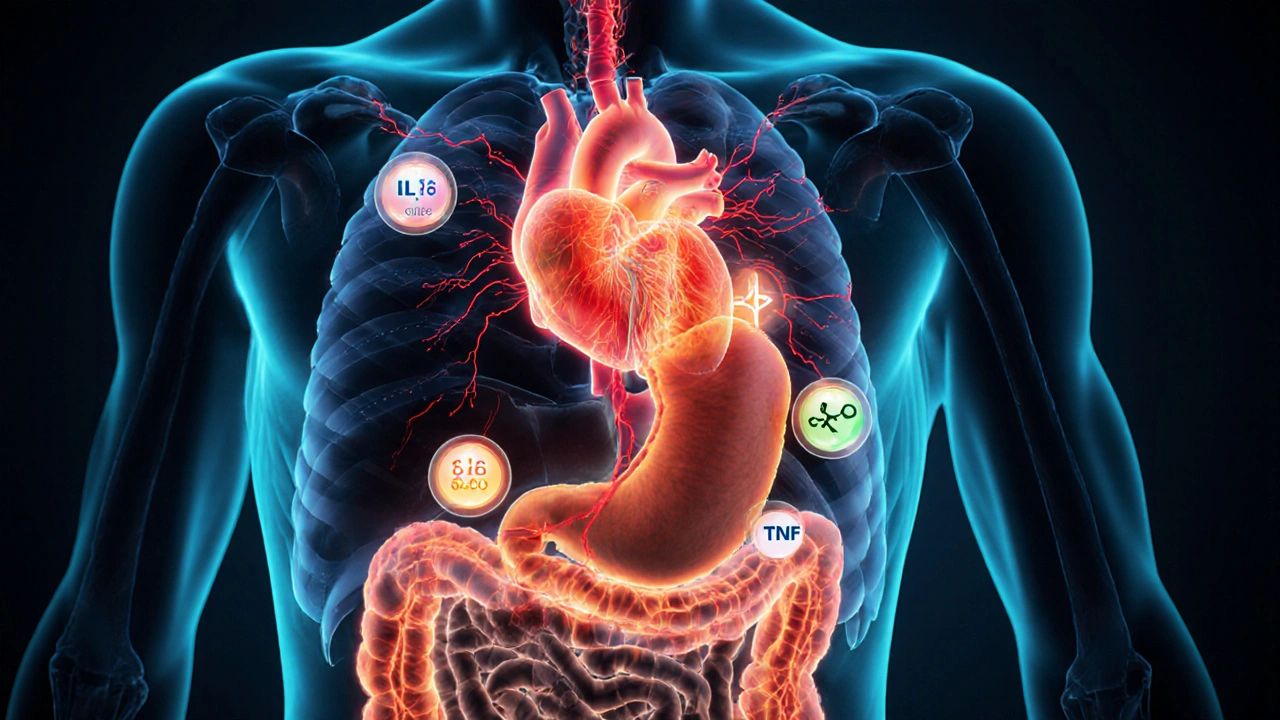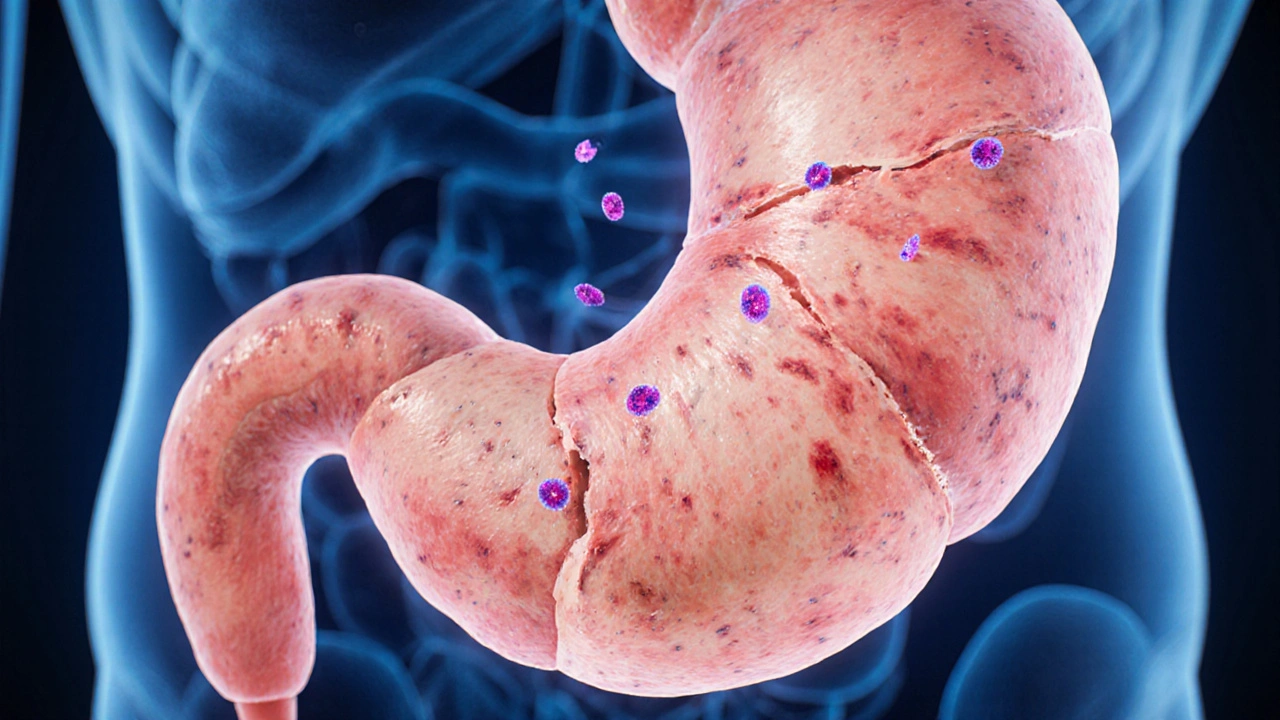Atrophic Gastroenteritis & Heart Health Risk Calculator
This tool estimates your potential cardiovascular risk factors related to atrophic gastroenteritis. Please answer the following questions about your symptoms and health status:
Your Risk Assessment
When you hear Atrophic gastroenteritis is a chronic inflammation that thins the stomach lining and hampers nutrient absorption, you probably picture stomach cramps, not a racing heart. Yet growing research shows the gut and heart talk to each other nonstop. If your stomach lining is compromised, the ripple effects can reach your cardiovascular system, raising the odds of hypertension, arrhythmias, and even heart disease.
What Exactly Is Atrophic Gastroenteritis?
The condition centers on the gastric mucosa the inner lining of the stomach responsible for producing acid and protective mucus. Persistent inflammation causes the cells to atrophy-or shrink-leading to reduced acid secretion and impaired digestion. Common triggers include chronic Helicobacter pylori infection, autoimmune attacks on parietal cells, and long‑term use of proton‑pump inhibitors.
Key symptoms are dull upper‑abdominal pain, early satiety, and a feeling of fullness after tiny meals. Because the stomach struggles to break down food, patients often develop malabsorption the inability to extract essential nutrients from the diet. Over time, this can snowball into serious systemic issues.
How the Gut Impacts the Heart: The Gut‑Heart Axis
The phrase "gut‑heart axis the bidirectional communication pathway linking intestinal health to cardiovascular function" may sound scientific, but the concept is simple: what happens in the gut can set off chain reactions that affect blood vessels and the heart muscle.
Three main pathways drive this connection:
- Inflammatory signaling: Inflamed gut tissue releases cytokines (like IL‑6 and TNF‑α) into the bloodstream, nudging the arterial walls toward stiffness.
- Nutrient deficiencies: Poor absorption lowers levels of vitamin B12, folate, and magnesium-nutrients essential for keeping the heart rhythm steady.
- Microbial metabolites: An altered microbiome produces excess trimethylamine N‑oxide (TMAO), a compound linked to plaque buildup.
When any of these pathways stay active for months or years, the heart feels the pressure.

Specific Cardiac Risks Tied to Atrophic Gastroenteritis
Below is a quick snapshot of how the condition can translate into concrete heart problems:
| Mechanism | Heart Effect | Risk Level |
|---|---|---|
| Systemic inflammation | Endothelial dysfunction → higher blood pressure | Moderate |
| Vitamin B12 & folate deficiency | Elevated homocysteine → arterial plaque | High |
| Electrolyte imbalance (e.g., low potassium) | Arrhythmias, palpitations | Variable |
| Increased TMAO from dysbiosis | Atherosclerosis progression | Low‑to‑moderate |
Why Nutrient Deficiencies Matter for Your Heart
Two deficiencies dominate the conversation:
- Vitamin B12 deficiency a lack of cobalamin that can cause anemia, nerve damage, and elevated homocysteine levels. High homocysteine is a proven risk factor for coronary artery disease.
- Folate deficiency insufficient folic acid leading to similar homocysteine spikes. Together, they erode the protective lining of blood vessels.
Both nutrients rely on a healthy stomach environment for absorption. When the gastric mucosa atrophies, intrinsic factor production drops, making it harder for the body to grab B12 from food.
Magnesium and potassium deficiencies also sneak in, especially if diarrhea accompanies the condition. Low potassium can trigger premature heartbeats, while magnesium shortfalls make the heart more prone to electrical instability.
How to Guard Your Heart If You Have Atrophic Gastroenteritis
Managing the gut is the first line of defense, but you also need targeted heart‑protective measures.
- Get diagnosed early: A gastroenterologist can confirm atrophy via endoscopy and biopsies. Blood tests for B12, folate, iron, and electrolytes give a full picture.
- Replace missing nutrients: High‑dose B12 injections bypass the stomach, while oral folate (400‑800µg daily) and a magnesium‑glycinate supplement help restore balance.
- Control inflammation: Eradicate H.pylori if present, consider short‑term steroids for autoimmune cases, and adopt an anti‑inflammatory diet (rich in omega‑3s, berries, leafy greens).
- Monitor heart health: Regular blood pressure checks, ECGs, and lipid panels catch early signs of cardiovascular strain.
- Stay hydrated and correct electrolytes: Oral rehydration solutions with potassium chloride can offset losses from diarrhea.
- Exercise wisely: Low‑impact cardio-walking, swimming, or cycling-for 150minutes a week improves vascular function without overtaxing the gut.
Following this checklist keeps the gut‑heart feedback loop from spiraling.

When to Seek Immediate Medical Help
Some red‑flag symptoms mean the heart might already be under stress:
- Sudden chest pressure or tightness
- Rapid or irregular heartbeat lasting more than a few minutes
- Severe shortness of breath at rest
- Dizziness or fainting episodes
If any appear, call emergency services. Early intervention can prevent a full‑blown cardiac event.
Future Directions: Research and Emerging Therapies
Scientists are now testing probiotic blends designed to lower TMAO production, and a handful of clinical trials are exploring whether B12‑rich fortified foods can reverse vascular damage in atrophic patients. While still experimental, these studies highlight a shift toward treating the gut‑heart axis as a single system rather than two separate ailments.
In short, if you’ve been diagnosed with atrophic gastroenteritis, don’t treat it as a stomach‑only issue. The heart is watching, and with the right steps, you can keep both organs running smoothly.
Frequently Asked Questions
Can atrophic gastroenteritis cause heart attacks?
It doesn’t cause heart attacks directly, but the chronic inflammation and nutrient deficiencies it creates can accelerate atherosclerosis, making a heart attack more likely over time.
Is oral B12 enough for people with this condition?
Often not. The stomach’s intrinsic factor is reduced, so many doctors recommend sub‑cutaneous B12 injections or high‑dose oral tablets that can be absorbed passively.
What diet changes help protect my heart?
Focus on anti‑inflammatory foods: fatty fish, nuts, olive oil, and plenty of vegetables. Limit processed meats, sugary drinks, and excess salt, which can worsen hypertension.
Will treating the gut inflammation lower my blood pressure?
Yes, reducing systemic inflammation often improves vascular tone, leading to modest drops in blood pressure for many patients.
Are there any safe exercise routines for someone with severe malabsorption?
Low‑impact cardio like walking or swimming, combined with gentle strength training, is ideal. It boosts heart health without stressing the digestive system.


10 Comments
October 9, 2025 Dilip Parmanand
Stay hydrated and get your B12 checked-simple steps can cut the cardiac strain.
October 23, 2025 Sarah Seddon
Wow, the link between a tired gut and a rattling heart is more than just a gut feeling!
When your stomach walls thin out, they lose the grip on nutrients, and that can ripple straight to your cardiovascular system.
Think of it as a domino effect: low B12, electrolyte chaos, and suddenly your heart is working overtime.
Fortunately, a few lifestyle tweaks and regular check‑ups can keep the cascade in check.
November 6, 2025 Ari Kusumo Wibowo
Totally agree-keeping an eye on those hidden deficiencies feels like a proactive hug for your heart.
Kidney labs and a quick B12 spot test are cheap insurance.
And don’t forget potassium; a banana a day can be a lifesaver.
November 20, 2025 Hannah Gorman
Atrophic gastroenteritis, commonly known as chronic gastritis with mucosal thinning, can silently alter nutrient absorption.
When the stomach lining fails to absorb vitamin B12, homocysteine levels rise, a known risk factor for endothelial dysfunction.
Elevated homocysteine damages the inner lining of blood vessels, making them more prone to atherosclerotic plaque buildup.
Similarly, persistent potassium loss can disrupt cardiac electrophysiology, leading to arrhythmias.
The combination of anemia, low B12, and electrolyte imbalance places extra workload on the heart.
Over time, the myocardium compensates by hypertrophying, which increases oxygen demand.
In patients with pre‑existing hypertension, this compensatory mechanism can precipitate heart failure.
Studies have shown a correlation between chronic gastritis and higher incidence of coronary artery disease, especially in older adults.
The inflammatory milieu generated by Helicobacter pylori infection, a common cause of atrophic changes, also releases cytokines that promote vascular inflammation.
Cytokines such as interleukin‑6 and tumor necrosis factor‑α accelerate plaque instability.
Moreover, chronic inflammation can impair lipid metabolism, raising LDL cholesterol levels.
The gut‑heart axis is further complicated by altered gut microbiota, which produces metabolites that affect endothelial function.
Short‑chain fatty acids, when depleted, reduce anti‑inflammatory signaling in the vasculature.
Clinicians should therefore screen patients with atrophic gastroenteritis for cardiovascular risk factors even if they feel fine.
Early detection of B12 deficiency, electrolyte disturbances, and blood pressure changes can guide preventive therapy.
Lifestyle interventions, supplementation, and regular cardiac monitoring are key to breaking the vicious cycle.
December 4, 2025 Tatiana Akimova
Exactly, don’t wait for a heart scare to act-grab that B12 supplement now and keep potassium levels steady.
Every ounce of effort today saves a pound of medication tomorrow.
Take charge of your gut, and your heart will thank you.
December 18, 2025 Calandra Harris
Your heart doesn't care about borders.
December 31, 2025 Dan Burbank
One must appreciate that the pathophysiology of atrophic gastritis extends beyond the luminal confines of the stomach, infiltrating systemic vascular homeostasis.
It is a lamentable oversight that clinicians often relegate gastrointestinal ailments to a realm of benign inconvenience.
Nonetheless, the cascade of micronutrient deficits-particularly cobalamin and electrolytes-exerts a deleterious influence upon myocardial electrophysiology.
In the theater of medicine, the gut and heart perform a duet, each note resonating within the other's rhythm.
Thus, a holistic diagnostic lens is not merely advisable but imperative.
January 14, 2026 Anna Marie
We understand that navigating these health nuances can feel overwhelming.
Rest assured, regular monitoring of B12 and potassium levels, coupled with blood pressure checks, provides a solid safety net.
Integrating balanced nutrition and stress‑reduction techniques further fortifies cardiovascular resilience.
Please consult your physician to tailor a plan that aligns with your unique needs.
January 28, 2026 Abdulraheem yahya
The aforementioned discourse, while eloquently articulated, may inadvertently obfuscate practical steps for the average patient.
In reality, the crux lies in simple actions: a periodic complete blood count, serum B12 assay, and electrolyte panel.
These tests, ordered semi‑annually, can illuminate early derangements before they manifest as cardiac events.
Moreover, dietary inclusions such as fortified cereals, leafy greens, and lean meats can replenish deficient nutrients.
Coupled with mindfulness practices to mitigate stress‑induced hypertension, the regimen becomes both comprehensive and attainable.
Physicians should also consider empiric B12 injections for those with documented malabsorption.
Ultimately, the synthesis of vigilant screening and proactive lifestyle adjustments bridges the gap between theory and tangible health outcomes.
February 11, 2026 Preeti Sharma
While the mainstream narrative emphasizes the gut‑heart connection, it's worth questioning whether the relationship is truly causal or merely correlative.
After all, many patients with atrophic gastroenteritis never develop cardiovascular problems.
Perhaps genetic predisposition or other environmental factors play a more pivotal role.
We should remain cautious about over‑medicalizing a condition that often remains asymptomatic.
Balanced skepticism can guide more nuanced research and patient care.
Write a comment